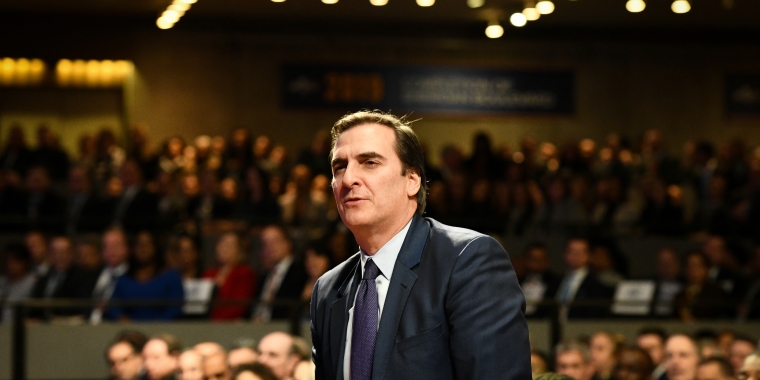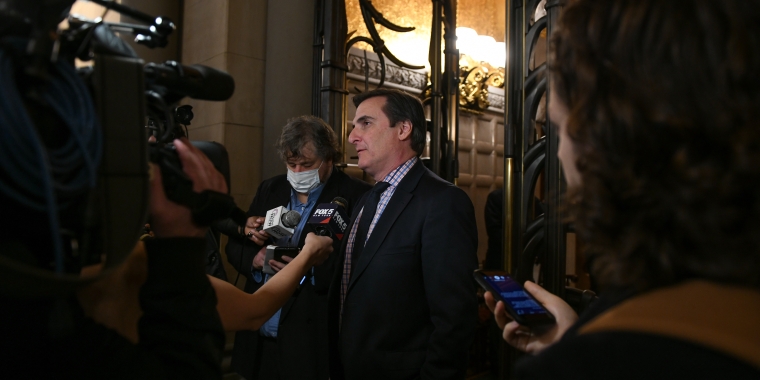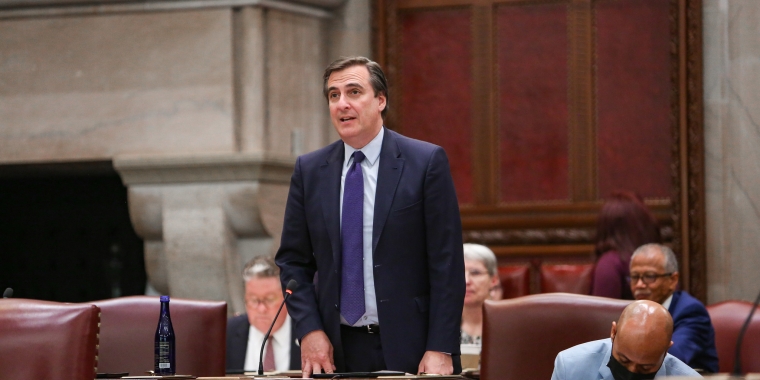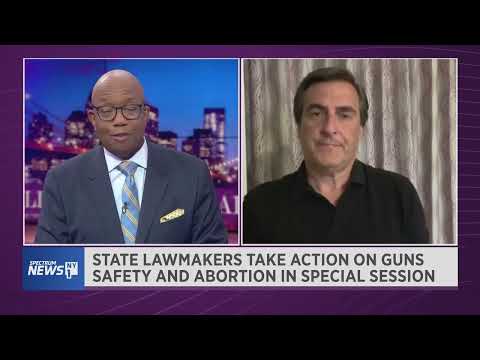
The Capitol Forum: New York State Antitrust: Senate, Assembly Bills Seen Having Good Chance to Pass in 2021; Policymakers and Big Businesses Across the Country are Watching

New York legislation to expand the state’s antitrust authority appears to have good prospects for passing into law next year, though it’s expected to face strong opposition from the tech industry and others, according to Capitol Forum analysis and interviews of the lead sponsors and other parties.
Identical bills in the state Senate and Assembly would empower New York’s attorney general (NYAG) to bring monopolization cases in state courts against companies for unilateral conduct. It would also add a sweeping new standard of “abuse of dominant position,” allow class-action suits, and hike fining authority.
Senate Deputy Majority Leader Michael Gianaris (D), author of the Twenty-First Century AntiTrust Act (S 8700A), said state law needs to be updated to address increasing concentration and abuses. He said he’s not targeting specific companies but did note tech giants whose CEOs testified at a U.S. House antitrust panel July hearing: Amazon (AMZN), Apple (AAPL), Facebook (FB) and Google (GOOG).
“Big tech has become very big, and the economic power they’ve achieved is unprecedented, and that is now spilling over into political power in a way that’s dangerous,” Gianaris said. “The economy has changed faster than the regulatory structure has kept up.”
Given the difficulty in bringing and winning monopolization cases in federal court, and given federal antitrust enforcers’ general reluctance to bring monopolization cases over the past decade, experts say that stepped up monopolization cases from the NYAG and private litigants in New York could go a long way to reversing a 40-year trend of lax monopolization enforcement and that the impact would likely be felt beyond just the tech industry.
“Positive reaction,” “Hopeful.”
Gianaris said the bill has received a “positive reception” in the legislature and noted NYAG Letitia James is supportive. “I think this will be taken up in earnest in next year’s session” starting in January, he said. Various “tech companies have engaged in conduct that clearly is not in the interest of the public,” and “we want to make sure there’s a remedy,” said Assemblyman Jeffrey Dinowitz (D), author of the companion bill (A 10870). This “will be very high on my agenda for next year,” he said. “I’m hopeful.”
Both chambers are controlled by big Democratic majorities that could get bigger next year after the election; Governor Andrew Cuomo is a Democrat; and NYAG James is a Democrat. Cuomo’s office didn’t respond to queries.
Stars aligning?
“I’d give it better than a 50% chance,” said Jeffrey Blumenfeld, a Lowenstein Sandler antitrust attorney with tech clients who is focused on competition issues but not advocating on the bills. He said the identical language is a “strong sign of support” for a measure that “resonates,” given the abuse concerns. Blumenfeld, a former DOJ antitrust official, said the use of the European abuse-of-dominance standard could lower the bar and facilitate antitrust complaints that would otherwise be more difficult under U.S. law.
The legislation “is something to watch,” said Harry First, New York University law professor and chief of the NYAG Antitrust Bureau in 1999-2001, who backs the bill’s thrust. “It’s an approach to the problem that could gain traction.”
“This is serious legislation with momentum behind it,” said internet consultant Scott Cleland, president of Precursor LLC and a critic of Google, Facebook and Amazon “anti-competitive” practices. Even an opponent sees a threat.
“It’s a real concern to us,” said Ken Pokalsky, vice president of The Business Council of New York State, which represents Amazon, Google, Facebook and Microsoft (MSFT), among others. “We certainly oppose the legislation as proposed. I think you’ll see virtually every sector-specific trade association raising concerns.” He said the pandemic, economy, and budget deficits cloud the outlook, but there are “significant advocacy forces behind the bill. The issue’s not going to go away.”
Deliberative process expected.
Gianaris cited two areas of particular concern. “One involves predatory pricing where players in the market are so big that they intentionally undercut their pricing even at a loss in order to drive out competitors, after which they increase their market dominance,” he said. He’s also concerned about search engines that “manipulate the search results to favor certain competitors over others, or even to favor” their own products.
The Senate Consumer Protection Committee has scheduled a Sept. 14 hearing on the bill. There could be more hearings.
“I want to move as quickly as possible, but I value the correctness of the outcome more than speed,” said Gianaris. “This is a very complex issue with vast ramifications, and we are a deliberative body… I expect to discuss this with all the relevant scholars and players in the industry over the next several months.”
Changes possible, but not yet seen as needed.
Gianaris said he’s “open to changes” but is “not sure they’re necessary right now.” “Of course I’m willing to hear from anyone on all sides,” he said. “I have not to this point heard anything that would compel me to change the language in the bill, but conversations are ongoing, with the understanding that I do believe that our laws are inadequate.”
“If people are going to come to the table and just say, ‘Don’t do it,’ that’s not going to get them very far,” Gianaris added. “If they have good ideas on how to do this better, of course any responsible legislator would listen.”
The offices of the top Democrats and Republicans in the primary committees and overall leadership of the Senate and Assembly, as well as spokespersons for Amazon, Apple, Facebook, Google, Microsoft and some tech groups declined to comment or didn’t respond to queries.
“This is typically not the type of bill that Republicans support,” said Dinowitz.
Blumenfeld believes partisan differences are smaller on antitrust, but said, “I would expect strong tech opposition to this.” Coalition of forces said helpful to legislation. The New York legislative prospects are aided by the fact that the Senate’s second-ranking leader is pushing the bill, Democrats run the legislature, Republicans nationally have concerns about big tech, and NYAG James backs the bills, said some parties.
Gianaris “has high expectations that he can get the bill out after the hearings, maybe with some changes, for passage next year,” said a New York lobbyist with tech clients but none of the companies mentioned above.
The lobbyist said the bill apparently “was drafted in concert” with the NYAG’s office. “We support legislation to strengthen [state antitrust laws] further to meet the challenges of today’s economy, and the need for additional tools to combat threats to competition,” said James in a statement. “We must ensure that we have the ability to effectively curtail harmful market dominance, and Senator Gianaris’ legislation is an important tool to do just that.”
The lobbyist said action is “likely” next year and bills generally pass once they move. “They rarely defeat bills on the floor,” the lobbyist added.
There are a lot of progressive Democrats in the New York legislature, said Shaoul Sussman, legal fellow at the Institute for Local Self-Reliance (ILSR), which backs the bills. “The attitude of lessprogressive Democrats” is key.
Criticism and concern.
The bill is “pretty expansive” authority for the NYAG and others, said The Business Council’s Pokalsky. “The potential leverage is enormous,” given the murky abuse-of-dominance standard, a 100-fold hike in corporate penalties, and class-action suits, he said. It could be decades “before we know what the rules are.”
There’s room for improving the law, but the bill “appears to go overboard” and could “open the floodgates of litigation,” said attorney Andrew Klein of Klein Law Group, who has broadband/telecom clients and isn’t involved in the legislation so far. “Plaintiff lawyers could run amok trying to class-up every grievance.” Klein said tech firms may be worried other states will follow New York’s example.
Pokalsky said interest in the bill is broadly shared beyond tech and policymakers: “Businesses nationwide are paying attention.” State AGs, federal authorities, and private parties can already bring antitrust suits under federal law, including for unilateral conduct, leading some to question the need for the New York legislation.
“Existing federal antitrust laws, including remedies, are extremely powerful and comprehensive,” said Tad Lipsky, competition advocacy director at the Global Antitrust Institute (which gets tech funding) of George Mason University’s law school, and a former senior DOJ and FTC official. Enforcement seen lacking, but coming. Federal authorities have been “slow to act” and are “hamstrung by certain restrictions,” Gianaris said. “The Feds can do it but they haven’t. As often is the case in our country, the states tend to act as the laboratories for good ideas, and New York has always played a leading role.”
“We have less authority than the federal government has,” he added. “So we’re trying to at least match that, but then also create the flexibility to go beyond what is currently the case so we can adjust our regulatory efforts to existing conditions.” Cleland sees a growing backlash as New York and other states work with federal authorities on possible Google and Facebook antitrust cases, U.S. House members prepare antitrust findings and recommendations, and overseas authorities investigate Google, Facebook, and Amazon.
“Apparently, New York is looking to use its leverage to ensure the Feds’ antitrust enforcements are as effective and aggressive as they can be,” Cleland said. “Where there’s smoke, there’s fire, and there’s smoke everywhere.”
Dominance language tweaks?
Gianaris defended using the European abuse-of-dominance standard. “We’ve seen that in Europe they have been much more aggressive in regulating some of the abuses,” he said. NYU’s First said there are ways to make the standard clearer, and suggested requiring the NYAG to come up with guidelines within a year or two. “The language will be tightened if necessary,” Gianaris said. But “we can’t itemize every individual action that would run afoul of the law because every day there’s a new tactic and the economy is changing so rapidly that we need some flexibility.”
Skepticism about legal challenges to statute. If the New York bill is enacted, there is broad agreement the courts would be key in interpreting the law, but most doubted the statute itself would be shot down on vagueness grounds.
“All these antitrust provisions are vague and could be subject to constitutional challenge, although I seriously doubt any such challenge would be successful,” said attorney Seth Bloom, ex-general counsel of the Senate Judiciary antitrust committee. The New York bill “is no vaguer than the Sherman Act,” said First.
The abuse-of-dominance standard could be challenged under the “dormant commerce clause,” suggested Eric Stock, a Gibson, Dunn & Crutcher attorney and NYAG Antitrust Bureau chief in 2013-2016. “A state law that sought to impose an entirely different standard for competition on firms operating nationally could very well be ruled unconstitutional as imposing an undue burden on interstate commerce.”
“It could be also perceived by the courts as an effort to assert extraterritorial control over commerce outside the state,” he said. “National companies don’t always have the practical ability to operate differently in every different state.”
ILSR’s Sussman was skeptical such a challenge would ultimately win. U.S. Supreme Court Chief Justice John Roberts and Justice Clarence Thomas “are not big fans of the dormant commerce clause, and the liberal justices would probably align with them, albeit for different reasons,” Sussman said, citing a Roberts opinion in United Haulers Assn., Inc. v. Oneida-Herkimer Solid Waste Management Authority (2007), among others.



